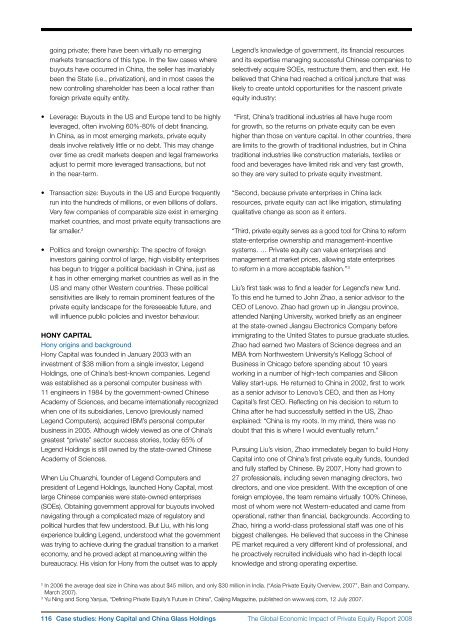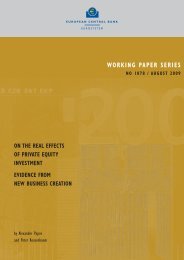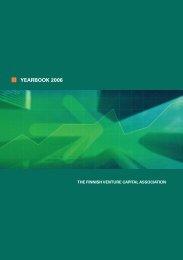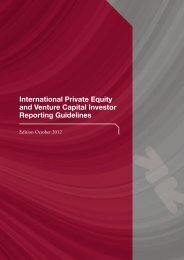going private; there have been virtually no emergingmarkets transactions <strong>of</strong> this type. In the few cases wherebuyouts have occurred in China, the seller has invariablybeen the State (i.e., privatization), and in most cases thenew controlling shareholder has been a local rather thanforeign private equity entity.• Leverage: Buyouts in the US and Europe tend to be highlyleveraged, <strong>of</strong>ten involving 60%‐80% <strong>of</strong> debt financing.In China, as in most emerging markets, private equitydeals involve relatively little or no debt. This may changeover time as credit markets deepen and legal frameworksadjust to permit more leveraged transactions, but notin the near‐term.• Transaction size: Buyouts in the US and Europe frequentlyrun into the hundreds <strong>of</strong> millions, or even billions <strong>of</strong> dollars.Very few companies <strong>of</strong> comparable size exist in emergingmarket countries, and most private equity transactions arefar smaller. 2• Politics and foreign ownership: <strong>The</strong> spectre <strong>of</strong> foreigninvestors gaining control <strong>of</strong> large, high visibility enterpriseshas begun to trigger a political backlash in China, just asit has in other emerging market countries as well as in theUS and many other Western countries. <strong>The</strong>se politicalsensitivities are likely to remain prominent features <strong>of</strong> theprivate equity landscape for the foreseeable future, andwill influence public policies and investor behaviour.Hony CapitalHony origins and backgroundHony Capital was founded in January 2003 with aninvestment <strong>of</strong> $38 million from a single investor, LegendHoldings, one <strong>of</strong> China’s best‐known companies. Legendwas established as a personal computer business with11 engineers in 1984 by the government‐owned ChineseAcademy <strong>of</strong> Sciences, and became internationally recognizedwhen one <strong>of</strong> its subsidiaries, Lenovo (previously namedLegend Computers), acquired IBM’s personal computerbusiness in 2005. Although widely viewed as one <strong>of</strong> China’sgreatest “private” sector success stories, today 65% <strong>of</strong>Legend Holdings is still owned by the state‐owned ChineseAcademy <strong>of</strong> Sciences.When Liu Chuanzhi, founder <strong>of</strong> Legend Computers andpresident <strong>of</strong> Legend Holdings, launched Hony Capital, mostlarge Chinese companies were state‐owned enterprises(SOEs). Obtaining government approval for buyouts involvednavigating through a complicated maze <strong>of</strong> regulatory andpolitical hurdles that few understood. But Liu, with his longexperience building Legend, understood what the governmentwas trying to achieve during the gradual transition to a marketeconomy, and he proved adept at manoeuvring within thebureaucracy. His vision for Hony from the outset was to applyLegend’s knowledge <strong>of</strong> government, its financial resourcesand its expertise managing successful Chinese companies toselectively acquire SOEs, restructure them, and then exit. Hebelieved that China had reached a critical juncture that waslikely to create untold opportunities for the nascent privateequity industry:“First, China’s traditional industries all have huge roomfor growth, so the returns on private equity can be evenhigher than those on venture capital. In other countries, thereare limits to the growth <strong>of</strong> traditional industries, but in Chinatraditional industries like construction materials, textiles orfood and beverages have limited risk and very fast growth,so they are very suited to private equity investment.“Second, because private enterprises in China lackresources, private equity can act like irrigation, stimulatingqualitative change as soon as it enters.“Third, private equity serves as a good tool for China to reformstate‐enterprise ownership and management‐incentivesystems. … <strong>Private</strong> equity can value enterprises andmanagement at market prices, allowing state enterprisesto reform in a more acceptable fashion.” 3Liu’s first task was to find a leader for Legend’s new fund.To this end he turned to John Zhao, a senior advisor to theCEO <strong>of</strong> Lenovo. Zhao had grown up in Jiangsu province,attended Nanjing University, worked briefly as an engineerat the state‐owned Jiangsu Electronics Company beforeimmigrating to the United States to pursue graduate studies.Zhao had earned two Masters <strong>of</strong> Science degrees and anMBA from Northwestern University’s Kellogg School <strong>of</strong>Business in Chicago before spending about 10 yearsworking in a number <strong>of</strong> high‐tech companies and SiliconValley start‐ups. He returned to China in 2002, first to workas a senior advisor to Lenovo’s CEO, and then as HonyCapital’s first CEO. Reflecting on his decision to return toChina after he had successfully settled in the US, Zhaoexplained: “China is my roots. In my mind, there was nodoubt that this is where I would eventually return.”Pursuing Liu’s vision, Zhao immediately began to build HonyCapital into one <strong>of</strong> China’s first private equity funds, foundedand fully staffed by Chinese. By 2007, Hony had grown to27 pr<strong>of</strong>essionals, including seven managing directors, twodirectors, and one vice president. With the exception <strong>of</strong> oneforeign employee, the team remains virtually 100% Chinese,most <strong>of</strong> whom were not Western-educated and came fromoperational, rather than financial, backgrounds. According toZhao, hiring a world-class pr<strong>of</strong>essional staff was one <strong>of</strong> hisbiggest challenges. He believed that success in the ChinesePE market required a very different kind <strong>of</strong> pr<strong>of</strong>essional, andhe proactively recruited individuals who had in‐depth localknowledge and strong operating expertise.2In 2006 the average deal size in China was about $45 million, and only $30 million in India. (“Asia <strong>Private</strong> <strong>Equity</strong> Overview, 2007”, Bain and Company,March 2007).3Yu Ning and Song Yanjua, “Defining <strong>Private</strong> <strong>Equity</strong>’s Future in China”, Caijing Magazine, published on www.wsj.com, 12 July 2007.116 Case studies: Hony Capital and China Glass Holdings<strong>The</strong> <strong>Global</strong> <strong>Economic</strong> <strong>Impact</strong> <strong>of</strong> <strong>Private</strong> <strong>Equity</strong> <strong>Report</strong> <strong>2008</strong>
Hony’s Chinese name means ambition and perseverance,two traits considered critically important for all Honypr<strong>of</strong>essionals. New recruits were given two books that theywere expected to have read by the end <strong>of</strong> their first weekon the job. One was <strong>The</strong> House <strong>of</strong> Morgan: An AmericanBanking Dynasty and the Rise <strong>of</strong> Modern Finance. 4 <strong>The</strong> bookresonated with Zhao because <strong>of</strong> the apparent similaritiesbetween the US at the turn <strong>of</strong> the 20th century andpresent‐day China. He believed that Morgan’s rise a centuryago captured the essence <strong>of</strong> Hony’s opportunity now. <strong>The</strong>second book, Goldman Sachs: <strong>The</strong> Culture <strong>of</strong> Success, 5focused on the embedded culture that contributed to theinvestment bank’s sustained success, and reflected Zhao’svision for Hony. “<strong>The</strong> people <strong>of</strong> Goldman Sachs are intenseand proud,” wrote one <strong>of</strong> Goldman’s leaders in the 1993annual review, “and they aren’t willing to settle for less thanbeing the very best in each <strong>of</strong> our significant operations.” 6In addition to building a pr<strong>of</strong>essional staff, the new CEObegan to flesh out Hony’s investment strategy. Thoughfew transactions existed at the time, Zhao never waveredfrom Liu’s vision <strong>of</strong> creating a private equity fund whoseprimary focus would be on purchasing controlling stakesin Chinese SOEs. Zhao first hired McKinsey & Companyto conduct a top‐down analysis <strong>of</strong> 99 broad sectors inthe Chinese economy. Based on the study, the consultingfirm recommended to Zhao and his team an investmentstrategy that focused on a few high growth sectors suchas pharmaceuticals, heavy equipment and constructionmaterials. Secondary interests included consumer goods,retail, media and financial services. Although float glass wasnot specifically included in McKinsey’s list <strong>of</strong> recommendedindustries, the Hony team believed that it had potential.Zhao explained that this early exercise with McKinseygave the Hony team focus and discipline as they beganto grow their private equity business.Since the first fund, Hony has gone on to raise twoadditional funds and by 2007 it had about $720 million <strong>of</strong>total committed capital. After relying 100% on Legend for thefirst fund, the second and third funds attracted some <strong>of</strong> theworld’s most prestigious LP investors, including the StanfordUniversity endowment, Goldman Sachs, Temasek Holdings,the Gates foundations and the Rothschild family. (SeeExhibit 1 for summary information on Hony Capital funds.)<strong>The</strong> Hony investment model“In the simplest terms,” Zhao explained, “we’re acompany builder. <strong>The</strong> key success factor in our businessis post‐investment execution.” Of course, the leaders <strong>of</strong>many private equity firms might express a similar view, butwhen Zhao elaborated on Hony’s investment model, some<strong>of</strong> the major differences between the Chinese and Westernapproaches to buyouts became apparent. As Zhao explained:“Hony’s deals differ in at least a half‐dozen ways fromtypical buyout deals in the US and Europe. We focus onprivatizations <strong>of</strong> state‐owned enterprises rather than publiclylisted private‐sector companies; given the state <strong>of</strong> China’scredit markets, leverage is not a significant factor in ourtransactions; we will not do a deal that involves significantasset stripping or major lay<strong>of</strong>fs; we do an enormous amount<strong>of</strong> due diligence on management because we are onlyinterested in deals where we have full confidence in theexisting management team; and possibly <strong>of</strong> greatestimportance, we must have a high level <strong>of</strong> confidenceearly in the due diligence process that our interests andmanagement’s are fully aligned about what needs to bedone after we invest to build value in the company. We helpthe management team to become market leaders in theirindustry by focusing on formulating strategy and vision.However, we don’t want to be in a position where we haveto interfere with daily operations.”Zhao believed this approach, coupled with the team’sdeep knowledge <strong>of</strong> Chinese business culture and the policyenvironment, would give Hony a considerable competitiveadvantage as the private equity industry continued to growand mature. Hony was also well placed to continuouslygenerate attractive deal flow, he believed, because histeam recognized the investment opportunities in a market farless efficient than that <strong>of</strong> developed countries. Hony couldselectively capitalize on these inefficiencies because its localknowledge was extensive and it understood better than mostthe nexus between China’s public policy agenda and therequirements for continued private sector growth. “Very fewvalue‐added investors are looking at the deals we do,” Zhaoexplained. “If we make the right judgments about companymanagers, we will succeed in most cases. China does not yethave a pr<strong>of</strong>essional management class by Western standards,so making good people decisions is a key factor for success.”Float Glass Industry Overview 7Opportunities in industry consolidation and cyclicality<strong>Global</strong> demand for flat glass between 1985 and 2004 hadconsistently grown at a rate approximately 1% faster thanglobal GDP, an encouraging sign for investors in a countrysuch as China that had been registering annual GDP increases<strong>of</strong> at least 9% for more than two decades. Furthermore, Chinais the single largest country in the glass market, accountingfor about a third <strong>of</strong> both global production and consumption.Domestic demand was poised to expand further with lawsand regulations requiring building materials to havetechnological innovations and higher energy efficiency.In 2003, when Hony was contemplating the Jiangsu Glassbuyout, China’s flat glass industry was extremely large yethighly fragmented. With China’s economy growing atbreakneck speed, every business related to the constructionindustry was booming. Yet compared to the global glass4Ron Chernow, New York, Grove Press, 2001.5Lisa Endlich, New York, Touchstone, 2000.6Lisa Endlich, Goldman Sachs: <strong>The</strong> Culture <strong>of</strong> Success, (New York, Touchstone, 2000), p180.7Materials on the industry overview are adapted from the China Glass Offering Prospectus, published 13 June 2005, p45-52.<strong>The</strong> <strong>Global</strong> <strong>Economic</strong> <strong>Impact</strong> <strong>of</strong> <strong>Private</strong> <strong>Equity</strong> <strong>Report</strong> <strong>2008</strong> Case studies: Hony Capital and China Glass Holdings 117
- Page 2 and 3:
The Globalization of Alternative In
- Page 5:
ContributorsCo-editorsAnuradha Guru
- Page 9 and 10:
PrefaceKevin SteinbergChief Operati
- Page 11 and 12:
Letter on behalf of the Advisory Bo
- Page 13 and 14:
Executive summaryJosh lernerHarvard
- Page 15 and 16:
• Private equity-backed companies
- Page 17 and 18:
C. Indian casesThe two India cases,
- Page 19 and 20:
Part 1Large-sample studiesThe Globa
- Page 21 and 22:
The new demography of private equit
- Page 23 and 24:
among US publicly traded firms, it
- Page 25 and 26:
should be fairly complete. While th
- Page 27 and 28:
according to Moody’s (Hamilton et
- Page 29 and 30:
draining public markets of firms. I
- Page 31 and 32:
FIguresFigure 1A: LBO transactions
- Page 33 and 34:
TablesTable 1: Capital IQ 1980s cov
- Page 35 and 36:
Table 2: Magnitude and growth of LB
- Page 37 and 38:
Table 4: Exits of individual LBO tr
- Page 39 and 40:
Table 6: Determinants of exit succe
- Page 41 and 42:
Table 7: Ultimate staying power of
- Page 43 and 44:
Appendix 1: Imputed enterprise valu
- Page 45 and 46:
Private equity and long-run investm
- Page 47 and 48:
alternative names associated with t
- Page 49 and 50:
4. Finally, we explore whether firm
- Page 51 and 52:
When we estimate these regressions,
- Page 53 and 54:
cutting back on the number of filin
- Page 55 and 56:
Table 1: Summary statisticsPanel D:
- Page 57 and 58:
Table 4: Relative citation intensit
- Page 59 and 60:
figuresFigure 1: Number of private
- Page 61 and 62:
Private equity and employment*steve
- Page 63 and 64:
Especially when taken together, our
- Page 65 and 66:
centred on the transaction year ide
- Page 67 and 68:
and Vartia 1985.) Aggregate employm
- Page 69 and 70:
sectors. In Retail Trade, the cumul
- Page 71 and 72:
employment-weighted acquisition rat
- Page 73 and 74:
FIguresFigure 1: Matches of private
- Page 75 and 76:
Figure 6:Figure 6A: Comparison of n
- Page 77 and 78:
Figure 8:Figure 8A: Comparison of j
- Page 79 and 80:
Figure 11: Variation in impact in e
- Page 81 and 82:
Figure 12: Differences in impact on
- Page 83 and 84: Private equity and corporate govern
- Page 85 and 86: et al (2007) track the evolution of
- Page 87 and 88: groups aim to improve firm performa
- Page 89 and 90: distribution of the LBO sponsors, m
- Page 91 and 92: the most difficult cases. This stor
- Page 93 and 94: to see whether these changes of CEO
- Page 95 and 96: Figure 3:This figure represents the
- Page 97 and 98: TablesTable 1: Company size descrip
- Page 99 and 100: Table 5: Changes in the board size,
- Page 101 and 102: Table 7: Board turnoverPanel A: Siz
- Page 103 and 104: Part 2Case studiesThe Global Econom
- Page 105 and 106: European private equity cases: intr
- Page 107 and 108: Exhibit 1: Private equity fund size
- Page 109 and 110: Messer Griesheimann-kristin achleit
- Page 111 and 112: ealized it was not possible to grow
- Page 113 and 114: The deal with Allianz Capital partn
- Page 115 and 116: the deal, the private equity invest
- Page 117 and 118: Exhibit 1: The Messer Griesheim dea
- Page 119 and 120: Exhibit 5: Post buyout structureMes
- Page 121 and 122: New Lookann-kristin achleitnerTechn
- Page 123 and 124: feet. This restricted store space w
- Page 125 and 126: institutional investors why this in
- Page 127 and 128: Although a public listing did not a
- Page 129 and 130: Exhibit 5: Employment development a
- Page 131 and 132: Chinese private equity cases: intro
- Page 133: Hony Capital and China Glass Holdin
- Page 137 and 138: Establishing early agreement on pos
- Page 139 and 140: Executing the IPOEach of the initia
- Page 141 and 142: Exhibit 1A: Summary of Hony Capital
- Page 143 and 144: Exhibit 4: Members of the China Gla
- Page 145 and 146: Exhibit 6A: China Glass post‐acqu
- Page 147 and 148: Exhibit 8: China Glass stock price
- Page 149 and 150: 3i Group plc and Little Sheep*Lily
- Page 151 and 152: y an aggressive franchise strategy,
- Page 153 and 154: soul” of the business. But there
- Page 155 and 156: Exhibit 1: Summary information on 3
- Page 157 and 158: Exhibit 6: An excerpt from the 180-
- Page 159 and 160: Indian private equity cases: introd
- Page 161 and 162: ICICI Venture and Subhiksha *Lily F
- Page 163 and 164: investment,” recalled Deshpande.
- Page 165 and 166: 2005 - 2007: Moderator, protector a
- Page 167 and 168: Exhibit 3: Subhiksha’s board comp
- Page 169 and 170: Warburg Pincus and Bharti Tele‐Ve
- Page 171 and 172: founded two companies at this time
- Page 173 and 174: By 2003 this restructuring task was
- Page 175 and 176: Exhibit 1C: Private equity investme
- Page 177 and 178: Exhibit 4B: Bharti cellular footpri
- Page 179 and 180: Exhibit 6: Summary of Bharti’s fi
- Page 181 and 182: Exhibit 7: Bharti’s board structu
- Page 183 and 184: In the 1993‐94 academic year, he
- Page 185 and 186:
consumer products. She was also a R
- Page 187 and 188:
AcknowledgementsJosh LernerHarvard
- Page 189:
The World Economic Forum is an inde















